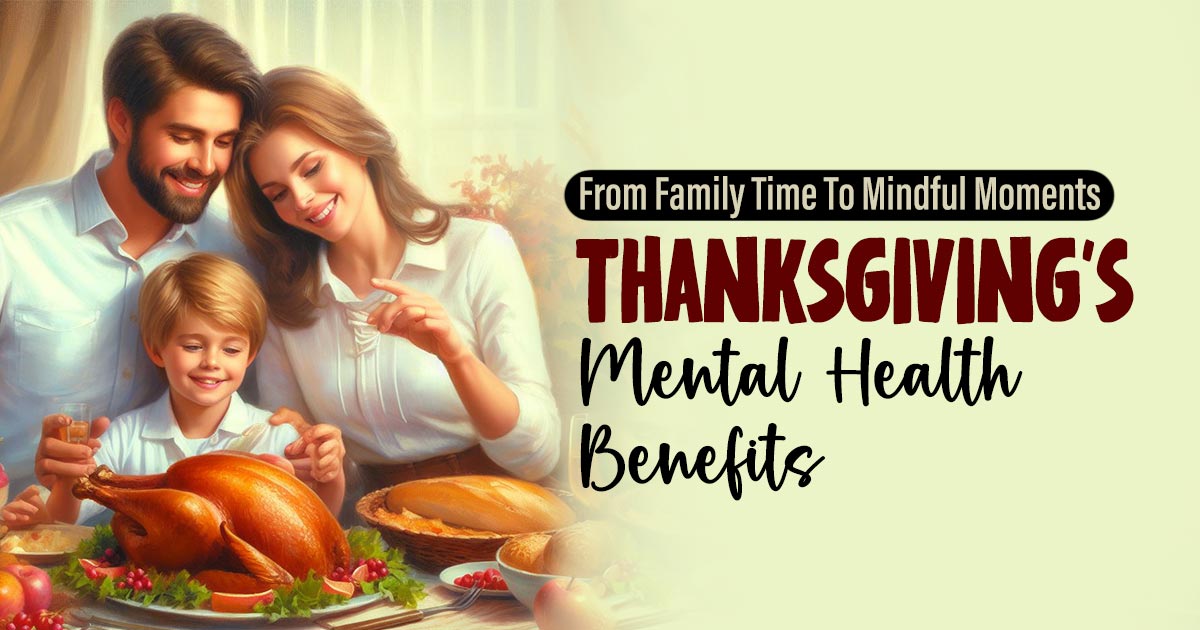Thanksgiving, a time-honored tradition in many cultures, transcends its historical origins to become a celebration that extends beyond a single day. Rooted in gratitude and communal gathering, studies over the years have acknowledged the mental health benefits of Thanksgiving—shedding light on the various ways in which this holiday positively influences individuals and communities.
Gratitude As A Psychological Anchor
At the core of Thanksgiving lies the practice of gratitude, a powerful psychological force that has been extensively studied for its positive impact on mental health. Gratitude involves recognizing and appreciating the positive aspects of life, fostering a mindset that focuses on abundance rather than scarcity. Psychologists, such as Robert Emmons and Martin Seligman, have conducted research revealing that cultivating gratitude is linked to increased happiness and life satisfaction.
Thanksgiving serves as an annual reminder to express gratitude for the blessings in one’s life. The act of acknowledging and appreciating these blessings not only enhances positive emotions but also contributes to a sense of overall well-being. The psychological benefits of gratitude extend beyond the Thanksgiving table, as individuals who incorporate gratitude into their daily lives report lower levels of stress, anxiety, and depression.
Social Connection And Community Bonding
Thanksgiving is a celebration deeply embedded in the fabric of communal living. The act of coming together with family and friends fosters a sense of belonging and social connection, both crucial elements for mental health. Human beings are social creatures, and the quality of our relationships plays a pivotal role in shaping our psychological well-being.
The holiday season, with Thanksgiving as its cornerstone, provides an opportunity for individuals to strengthen their social bonds. Shared meals, laughter, and the exchange of stories create an atmosphere of warmth and camaraderie. Research indicates that positive social interactions have a direct impact on mental health, reducing feelings of loneliness and promoting emotional resilience.
Moreover, the act of giving thanks in a group setting reinforces a collective sense of gratitude, amplifying its psychological effects. Shared expressions of thankfulness create a positive feedback loop within the community, enhancing the overall mood and contributing to a supportive and nurturing social environment.
Coping Mechanism And Stress Reduction
In the fast-paced and often stressful modern world, finding effective coping mechanisms is essential for maintaining mental health. The mental health benefits of Thanksgiving lie in providing a unique avenue for stress reduction through various channels.
Firstly, the act of preparing and sharing a meal can be therapeutic. Cooking and engaging in the creative process of crafting a Thanksgiving feast can serve as a mindful activity, promoting a sense of accomplishment and relaxation. Moreover, the communal nature of the meal fosters a collaborative environment, further reducing the sense of individual burden.
Secondly, the emphasis on gratitude during Thanksgiving acts as a counterbalance to the stressors of daily life. Taking time to reflect on positive aspects and express appreciation helps individuals reframe their perspectives, mitigating the impact of stressors on mental health. This intentional focus on gratitude aligns with mindfulness practices, which have been shown to have positive effects on stress reduction and overall mental well-being.

Reflection And Self-discovery
Thanksgiving encourages individuals to engage in reflective practices, contemplating the meaning and significance of gratitude in their lives. This introspective process can lead to self-discovery and personal growth, which constitute some of the major mental health benefits of Thanksgiving.
As individuals reflect on the things they are thankful for, they gain insights into their values, priorities, and sources of joy. This self-awareness contributes to a more authentic and fulfilling life, aligning one’s actions with their core beliefs. Psychologically, this process is akin to narrative therapy, where individuals construct positive stories about their lives, fostering a sense of coherence and purpose.
Furthermore, the act of expressing gratitude can be empowering. By vocalizing appreciation for the people, experiences, and opportunities that have shaped their lives, individuals reinforce positive narratives and cultivate a resilient mindset. This narrative reinforcement is a powerful tool in promoting mental health, providing a counterbalance to negative thought patterns.
Generosity And Acts Of Kindness
Thanksgiving often extends beyond expressions of gratitude to encompass acts of generosity and kindness. Whether through volunteering, charitable donations, or simply helping others in need, the holiday season encourages individuals to engage in prosocial behavior.
Research in positive psychology suggests that acts of kindness have a profound impact on mental well-being. When individuals engage in altruistic actions, whether big or small, they experience an increase in positive emotions and a sense of purpose. Thanksgiving serves as a catalyst for these acts of kindness, creating a ripple effect of positivity within communities.
Moreover, the act of giving thanks is reciprocal. Individuals who express gratitude often find themselves inspired to contribute positively to the well-being of others. This reciprocal relationship between gratitude and generosity strengthens social bonds, creating a sense of interconnectedness that is fundamental to mental health.
In a world where the prevalence of mental health challenges is on the rise, the mental health benefits of Thanksgiving offer a timely reminder of the importance of gratitude, social connection, and generosity in promoting well-being. As individuals come together to give thanks and share in the spirit of the season, they not only strengthen their own mental health but also contribute to the creation of a healthier and more compassionate society.



